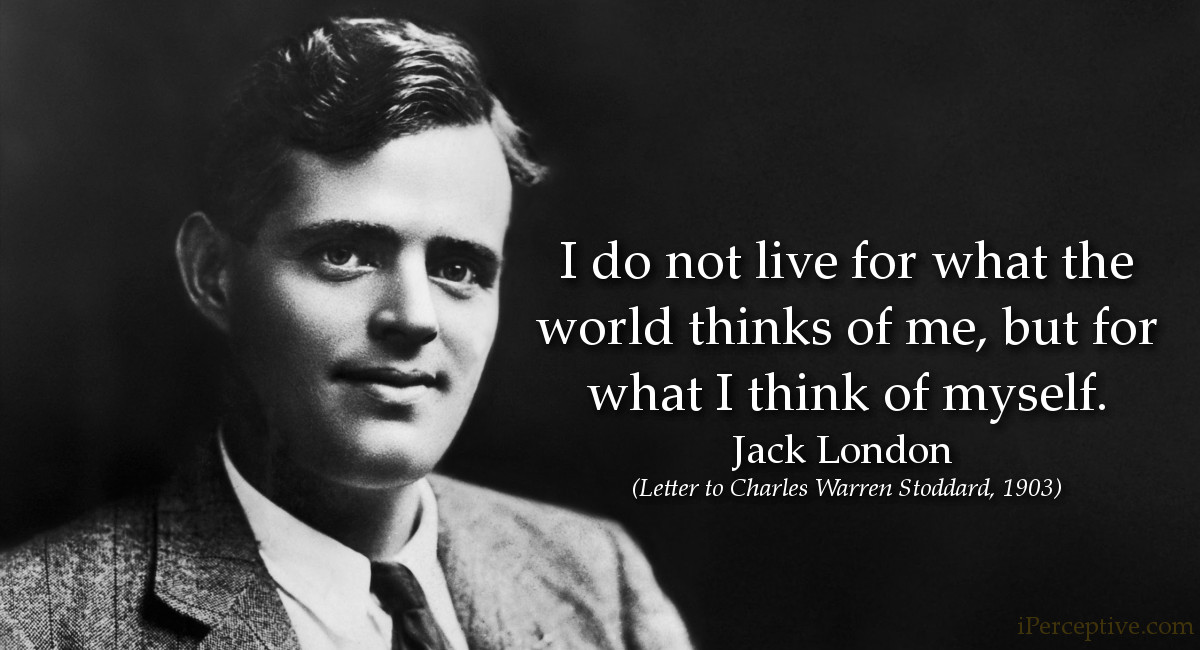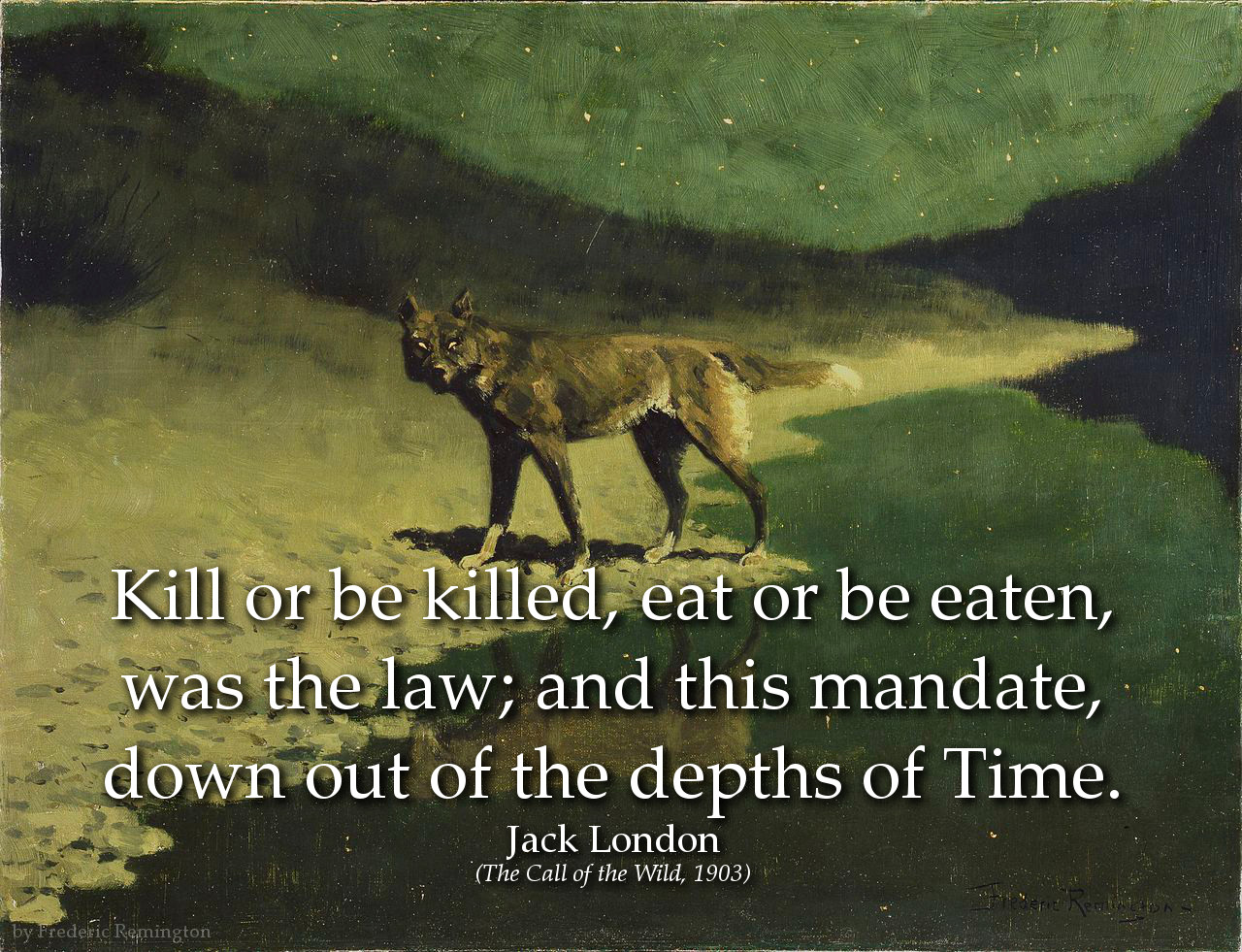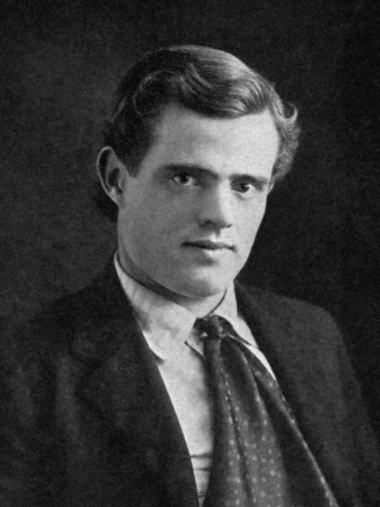Jack London Quotes

A man with a club is a law-maker.
I am. I was. I am not. I never am.
To be able to forget means sanity.
Fear urged him to go back, but growth drove him on.
Age is never so old as youth would measure it.
Love, genuine passionate love, was his for the first time.
Intelligent men are cruel. Stupid men are monstrously cruel.
The Wild still lingered in him and the wolf in him merely slept.
Limited minds can recognize limitations only in others.
Love is the sum of all the arts, as it is the reason for their existence.
If cash comes with fame, come fame; if cash comes without fame, come cash.
Too much is written by the men who can't write about the men who do write.
I do not live for what the world thinks of me, but for what I think of myself.
I am I. And I won't subordinate my taste to the unanimous judgment of mankind.
The ghostly winter silence had given way to the great spring murmur of awakening life.
One cannot violate the promptings of one's nature without having that nature recoil upon itself.
Life achieves its summit when it does to the uttermost that which it was equipped to do.

Kill or be killed, eat or be eaten, was the law; and this mandate, down out of the depths of Time.
He had been suddenly jerked from the heart of civilization and flung into the heart of things primordial.
A bone to the dog is not charity. Charity is the bone shared with the dog when you are just as hungry as the dog.
I love the flesh. I'm a pagan. “Who are they who speak evil of the clay? The very stars are made of clay like mine!”
There are things greater than our wisdom, beyond our justice. The right and wrong of this we cannot say, and it is not for us to judge.
I'd rather sing one wild song and burst my heart with it, than live a thousand years watching my digestion and being afraid of the wet.
Don’t loaf and invite inspiration; light out after it with a club, and if you don’t get it you will nonetheless get something that looks remarkably like it.
The trouble with him was that he was without imagination. He was quick and alert in the things of life, but only in the things, and not in the significances.
He lacked the wisdom, and the only way for him to get it was to buy it with his youth; and when wisdom was his, youth would have been spent buying it.
I write for no other purpose than to add to the beauty that now belongs to me. I write a book for no other reason than to add three or four hundred acres to my magnificent estate.
There is an ecstasy that marks the summit of life, and beyond which life cannot rise. And such is the paradox of living, this ecstasy comes when one is most alive, and it comes as a complete forgetfulness that one is alive.
He was mastered by the sheer surging of life, the tidal wave of being, the perfect joy of each separate muscle, joint, and sinew in that it was everything that was not death, that it was aglow and rampant, expressing itself in movement, flying exultantly under the stars.
But especially he loved to run in the dim twilight of the summer midnights, listening to the subdued and sleepy murmurs of the forest, reading signs and sounds as a man may read a book, and seeking for the mysterious something that called -- called, waking or sleeping, at all times, for him to come.
He had no conscious knowledge of death, but like every animal of the Wild, he possessed the instinct of death. To him it stood as the greatest of hurts. It was the very essence of the unknown; it was the sum of the terrors of the unknown, the one culminating and unthinkable catastrophe that could happen to him, about which he knew nothing and about which he feared everything.
I would rather be ashes than dust! I would rather that my spark should burn out in a brilliant blaze than it should be stifled by dry-rot. I would rather be a superb meteor, every atom of me in magnificent glow, than a sleepy and permanent planet. The proper function of man is to live, not to exist. I shall not waste my days in trying to prolong them. I shall use my time.
All my life I have had an awareness of other times and places. I have been aware of other persons in me. Oh, and trust me, so have you, my reader that is to be. Read back into your childhood, and this sense of awareness I speak of will be remembered as an experience of childhood. You were then not fixed, not crystallized. You were plastic, a soul in flux, a consciousness and an identity in the process of forming--ay, of forming and forgetting
A million years ago, the cave man, without tools, with small brain, and with nothing but the strength of his body, managed to feed his wife and children, so that through him the race survived. You on the other hand, armed with all the modern means of production, multiplying the productive capacity of the cave man a million times -- you are incompetents and muddlers, you are unable to secure to millions even the paltry amount of bread that would sustain their physical life. You have mismanaged the world, and it shall be taken from you!
Do you know the only value life has is what life puts upon itself? And it is of course overestimated, for it is of necessity prejudiced in its own favour. Take that man I had aloft. He held on as if he were a precious thing, a treasure beyond diamonds of rubies. To you? No. To me? Not at all. To himself? Yes. But I do not accept his estimate. He sadly overrates himself. There is plenty more life demanding to be born. Had he fallen and dripped his brains upon the deck like honey from the comb, there would have been no loss to the world. The supply is too large.
Such is my outlook. I look forward to a time when man shall progress upon something worthier and higher than his stomach, when there will be a finer incentive to impel men to action than the incentive of to-day, which is the incentive of the stomach. I retain my belief in the nobility and excellence of the human. I believe that spiritual sweetness and unselfishness will conquer the gross gluttony of to-day. And last of all, my faith is in the working-class. As some Frenchman has said, "The stairway of time is ever echoing with the wooden shoe going up, the polished boot descending."
Be delicate, little wife-woman. Never be without your veil, without many veils. Veil yourself in a thousand veils, all shimmering and glittering with costly textures and precious jewels. Never let the last veil be drawn. Against the morrow array yourself with more veils, ever more veils, veils without end. Yet the many veils must not seem many. Each veil must seem the only one between you and your hungry lover who will have nothing less than all of you. Each time he must seem to get all, to tear aside the last veil that hides you. He must think so. It must not be so. Then there will be no satiety, for on the morrow he will find another last veil that has escaped him.
Fiction pays best of all and when it is of fair quality is more easily sold. A good joke will sell quicker than a good poem, and, measured in sweat and blood, will bring better remuneration. Avoid the unhappy ending, the harsh, the brutal, the tragic, the horrible - if you care to see in print things you write. (In this connection don't do as I do, but do as I say.) Humour is the hardest to write, easiest to sell, and best rewarded... Don't write too much. Concentrate your sweat on one story, rather than dissipate it over a dozen. Don't loaf and invite inspiration; light out after it with a club, and if you don't get it you will nonetheless get something that looks remarkably like it.
Why, if there is anything in supply and demand, life is the cheapest thing in the world. There is only so much water, so much earth, so much air; but the life that is demanding to be born is limitless. Nature is a spendthrift. Look at the fish and their millions of eggs. For that matter, look at you and me. In our loins are the possibilities of millions of lives. Could we but find time and opportunity and utilize the last bit and every bit of the unborn life that is in us, we could become the fathers of nations and populate continents. Life? Bah! It has no value. Of cheap things it is the cheapest. Everywhere it goes begging. Nature spills it out with a lavish hand. Where there is room for one life, she sows a thousand lives, and it's life eats life till the strongest and most piggish life is left.
Dark spruce forest frowned on either side the frozen waterway. The trees had been stripped by a recent wind of their white covering of frost, and they seemed to lean toward each other, black and ominous, in the fading light. A vast silence reigned over the land. The land itself was a desolation, lifeless, without movement, so lone and cold that the spirit of it was not even that of sadness. There was a hint in it of laughter, but of laughter more terrible than any sadness-a laughter that was mirthless as the smile of the Sphinx, a laughter cold as the frost and partaking of the grimness of infallibility. It was the masterful and incommunicable wisdom of eternity laughing at the futility of life and the effort of life. It was the Wild, the savage, frozen-hearted Northland Wild.
Nature has many tricks wherewith she convinces man of his finity--the ceaseless flow of the tides, the fury of the storm, the shock of the earthquake, the long roll of heaven's artillery--but the most tremendous, the most stupefying of all, is the passive phase of the White Silence. All movement ceases, the sky clears, the heavens are as brass; the slightest whisper seems sacrilege, and man becomes timid, affrighted at the sound of his own voice. Sole speck of life journeying across the ghostly wastes of a dead world, he trembles at his audacity, realizes that his is a maggot's life, nothing more. Strange thoughts arise unsummoned, and the mystery of all things strives for utterance. And the fear of death, of God, of the universe comes over him--the hope of the Resurrection and the Life, the yearning for immortality, the vain striving of the imprisoned essence--it is then, if ever, man walks alone with God.

